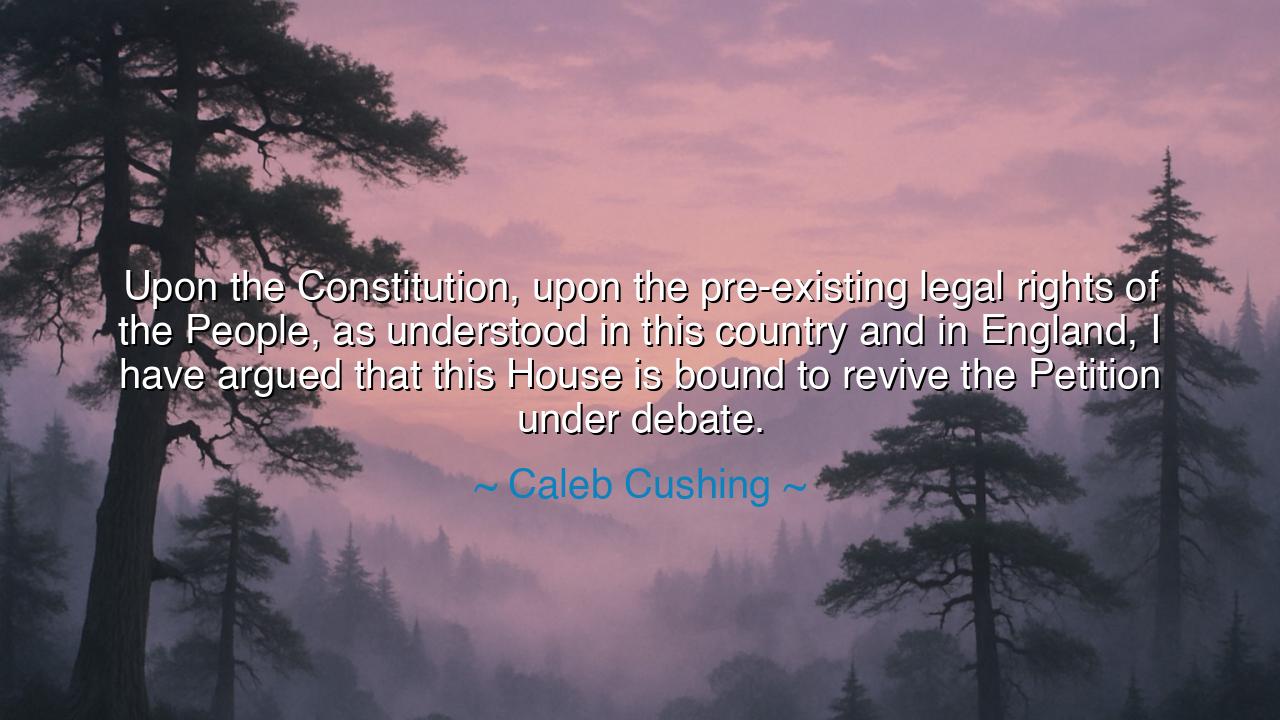
Upon the Constitution, upon the pre-existing legal rights of the
Upon the Constitution, upon the pre-existing legal rights of the People, as understood in this country and in England, I have argued that this House is bound to revive the Petition under debate.






When Caleb Cushing declared, “Upon the Constitution, upon the pre-existing legal rights of the People, as understood in this country and in England, I have argued that this House is bound to revive the Petition under debate,” he spoke as a guardian of law and liberty, reminding his generation that no institution, however mighty, stands above the rights of the people. His words carry the cadence of a man steeped in history, one who saw in the law not merely a tool of governance, but a sacred covenant — a bridge between the ancient traditions of English liberty and the bold freedoms of the American Republic. To him, the Constitution was not a document of convenience, but a living expression of the people’s enduring sovereignty, and the right to petition was one of its holiest expressions.
The origin of this quote lies in the political struggles of nineteenth-century America, when Caleb Cushing, a statesman, jurist, and orator of immense learning, stood before the House of Representatives to defend the sacred right of the citizen to bring grievances before the government. The “Petition under debate” referred to a motion that many in Congress sought to suppress — a petition dealing with controversial issues, perhaps too divisive for the comfort of those in power. Yet Cushing, drawing upon his deep knowledge of both American constitutional law and English legal tradition, argued that the right to petition preceded any government, any party, and even any constitution. It was the heartbeat of free society itself. To deny that right was not merely a political act — it was an act of injustice against the very foundation of liberty.
Cushing’s reference to “the pre-existing legal rights of the People” draws upon the ancient lineage of law — from the Magna Carta of 1215, which bound the English crown to the consent of its subjects, to the Bill of Rights of 1689, which affirmed that subjects had the right “to petition the King.” These principles were inherited by the American founders and woven into the First Amendment, which guarantees the right “to petition the Government for a redress of grievances.” To Cushing, this continuity was sacred: it formed an unbroken chain of liberty stretching from Runnymede to Philadelphia. Thus, his argument was not one of novelty, but of heritage — that the people’s right to be heard was older than kings, older than parliaments, older even than the Constitution itself.
In invoking both England and America, Cushing reminded his contemporaries that freedom is not an invention of any one nation, but a moral inheritance of all humanity. He saw the Constitution not as a cage that limits freedom, but as a vessel that carries the ancient rights of man into a new age. The House of Representatives, in his view, was not a master of the people, but their servant — bound by law and by honor to listen when the governed speak. To “revive the Petition,” therefore, was not a matter of politics, but of duty — an act of renewal for a democracy that must always breathe through the voices of its citizens.
There is a story from history that mirrors Cushing’s conviction: the struggle of John Lilburne, an Englishman of the seventeenth century, who was imprisoned for circulating pamphlets critical of authority. When brought before the Star Chamber, Lilburne refused to bow, crying, “I am a free-born Englishman!” His defiance helped lay the groundwork for the very rights of petition and speech that Cushing later defended across the ocean. Just as Lilburne’s courage birthed reform in England, so too did Cushing’s defense of the people’s rights affirm that liberty must always be guarded against the silence imposed by power.
Cushing’s words also carry a warning for all ages: that governments, when unchallenged, grow deaf to justice. The right to petition is more than the right to speak; it is the mechanism by which rulers remember that they rule by consent. When a government refuses to hear its people, it begins the slow descent into tyranny — not through open oppression, but through quiet indifference. Cushing’s insistence that the House was “bound” to revive the petition was therefore a call to conscience: to remind lawmakers that they serve not their own comfort, but the will of those whose freedom gave them authority.
Let this, then, be the lesson carried forward: that liberty survives not by the strength of armies nor by the grandeur of laws, but by the courage of citizens who demand to be heard. Every generation must guard its right to petition, for it is the voice of the people that keeps power from hardening into despotism. To ignore that voice is to forget the very purpose of government.
And so, the teaching of Caleb Cushing endures: the Constitution is not a shield for the powerful, but a sword for the people. The right to speak truth to authority — to petition, to protest, to demand redress — is the pulse of democracy itself. Honor it, defend it, and use it, for as long as men and women remember that their voices shape their destiny, the light of liberty shall never be extinguished.






AAdministratorAdministrator
Welcome, honored guests. Please leave a comment, we will respond soon